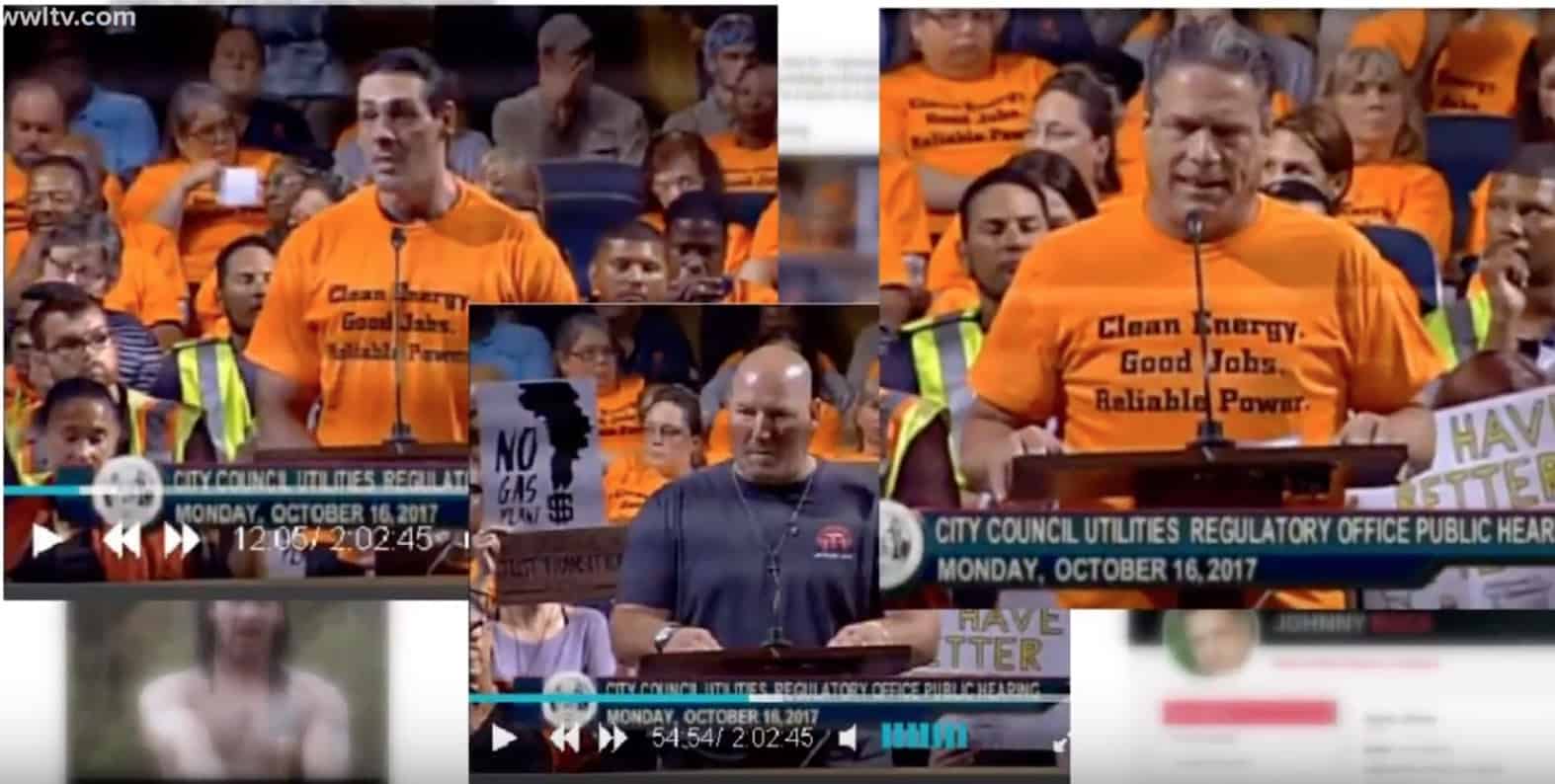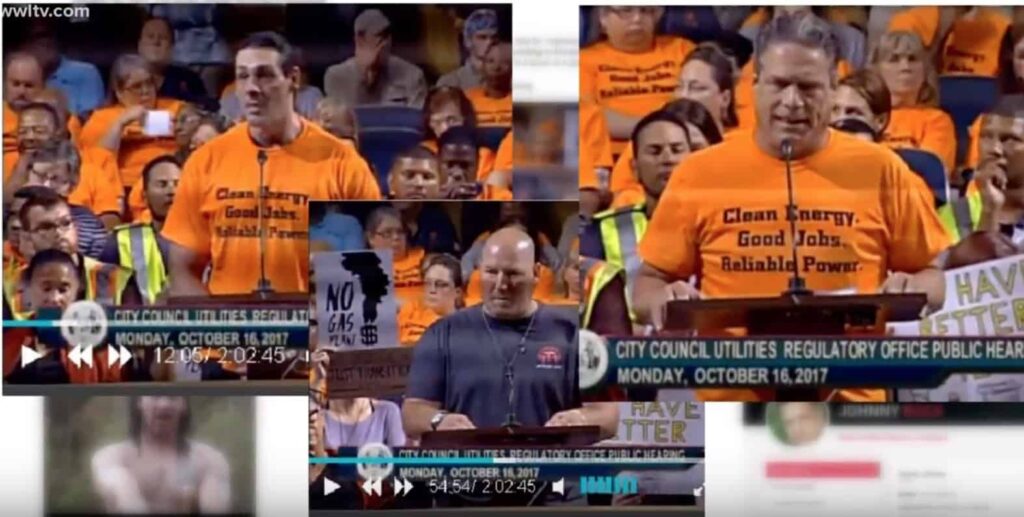Strings Attached: How utilities use charitable giving to influence politics and increase investor profits

Entergy
Entergy is a utility company that serves 2.9 million electric customers across Arkansas, Louisiana, Mississippi and Texas.
Basic Facts:
- EPI estimate of Entergy’s total charitable giving in most recent 5 years (2013-2017): $69,514,279. (1)
- Name of Foundation: Entergy Charitable Foundation
- Entergy Charitable Foundation (2013-2017): $14,869,106
- 2017 – $3,999,374
- 2016 – $5,158,685
- 2015 – $2,172,647
- 2014 – $2,467,147
- 2013 – $3,538,400
- Corporate Charitable Giving (2013-2017)
- Sum of total corporate giving in most recent 5 years according to Corporate Social Responsibility reports: $53,202,147. (2)
- 2017: $13,000,626
- 2016: $13,841,315
- 2015: $12,827,353
- 2014: $13,532,853
- 2013: Did not produce
- Sum of total charitable giving in most recent 5 years according to FERC Form 1 and Form 60 filings (including all subsidiaries): $69,514,279
- 2017: $11,485,653
- 2016: $13,774,461
- 2015: $15,315,720
- 2014: $12,991,272
- 2013: $15,947,173
- Sum of total corporate giving in most recent 5 years according to Corporate Social Responsibility reports: $53,202,147. (2)
- Entergy Charitable Foundation President:
- Kim Despeaux, ex-Senior Vice President, Federal Policy, Regulatory & Governmental Affairs, Entergy
- Entergy Charitable Foundation Board of Directors:
- Kim Despeaux, ex-Senior Vice President, Federal Policy, Regulatory & Governmental Affairs, Entergy
- Drew Marsh, Executive Vice President and Chief Financial Officer, Entergy
- Donald Vinci, Executive Vice President and Chief Administrative Officer, Entergy
- Chris Bakken, Executive Vice President, Nuclear Operations and Chief Nuclear Officer, Entergy Nuclear
- Rick Riley, Senior Vice President of Distribution Operations and Asset Management. Ex-President and CEO, Entergy Arkansas
- Phillip May, President and CEO of Entergy Louisiana
- Sallie Rainer, President and CEO, Entergy Texas
- Charles Rice, ex-President and CEO, Entergy New Orleans
- Rod K West, Group President, Utility Operations, Entergy
- Marcus Brown, Executive Vice President and General Counsel, Entergy
Examples of Entergy using charitable giving to manipulate policy:
Entergy came under fire in May 2018 when the Lens revealed that many of the people who testified on behalf of Entergy’s proposed gas-fired power plant in New Orleans were paid actors.

But the paid actors weren’t the only people testifying on behalf of Entergy or the gas plant. A host of others, including directors of dozens of locally respected non-profits, also testified on behalf of Energy and its gas plant.
At least six of the organizations that testified at the New Orleans City Council’s hearing on the gas plant on Entergy’s behalf on October 16, 2017 received charitable donations from the Entergy Charitable Foundation, according to the foundation’s tax returns and acknowledgements by the organizations themselves.
Some of those organizations disclosed the donations by Entergy at the gas plant hearings, but others did not.
Howard Rodgers of the New Orleans Council on Aging said that “gas is an energy that we use that does not have any kind of additional effects.” Burning natural gas, a fossil fuel, contributes to climate change, which leads to more extreme weather and storm surges that have inundated New Orleans. Last year, Rodgers received a $300,000 novelty check from Rice, the Entergy CEO, to administer the utility’s “Power to Care” program.
Richard Arnold, the director of communications and development at Covenant House New Orleans, said that he was speaking on the youth center’s behalf and also as a city resident.
“I’d like to echo the prior comments about Entergy’s commitment to our community but also just add personally that I am very much in favor of investing in renewables, but I don’t think it’s an either-or. I think it’s a both-and. I think natural gas is an ideal bridge fuel that will help us get to our long-term renewable goals because it’s clean, and it’s cheap, and its regionally abundant, so I support the plant, thank you.”
Arnold did not disclose that Covenant House was a 2016 grantee of Entergy for an unknown sum of money. The charity also received $10,000 from Entergy in 2011.
The CEO of the YMCA of Greater New Orleans, Gordon Wadge, said that “Entergy is a faithful corporate partner and puts great thought into all of the efforts that they get behind in our community, and so I think that same great thought translates into the work that they will put into this new power plant, and I’m grateful to have Entergy in this community.”
The Entergy Charitable Foundation gave the YMCA of Greater New Orleans $25,000 for adult education services in 2016 and again in 2017, according to its tax filings.
Other organizations simply lavished praise on the utility itself, without mentioning the gas plant. Michael Williamson, the President and CEO of the United Way of Southeastern Louisiana, talked about Entergy’s donations to its efforts:
“Thank you Council Members and thank you to Charles Rice for inviting me to speak on behalf of Entergy’s long-standing commitment to our community.” Rice is the current CEO of Entergy.
“On last Thursday, Entergy dedicated another $1 million to the new Prosperity Center and its mission to lift individuals and families out of poverty and into financial stability,” Williamson continued, referring to the J. Wayne Leonard Prosperity Center, which is named after Entergy’s previous CEO. “The bottom line is Entergy is committed to creating a stronger, more prosperous and more equitable New Orleans. United Way is grateful to Entergy — to call Entergy a partner in our fight to build better and brighter futures for all.”
Footnotes
(1) Estimate based on Entergy’s reporting to federal regulators as it includes both Entergy’s corporate giving directly to organizations and the utility’s contributions to the Entergy Charitable Foundation, which is then donated to organizations.
(2) Entergy charitable giving reported on IRS Form 990s was subtracted from amounts included in CSR reports to avoid double counting, leaving corporate giving remaining.
Read the rest of the report and other utility case studies here.



